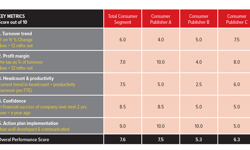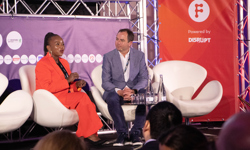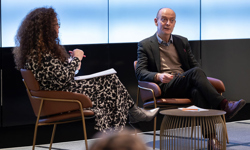Live events are a growing, and lucrative, activity for publishers, and face to face is holding its own in spite of the growth of online networking. However, many markets are crowded, delegates are busy and cash-strapped, and sponsors and exhibitors are demanding. Plus there is a cultural challenge for publishing teams making the transition to live events.
Russell Lawson, MD of Optimus Education, shared his experiences of running over 35 events a year for 7000 delegates in leadership roles in the maintained education sector.
Nick Shanagher, MD of Newtrade Publishing and Graham Lock of Cogent Events, discussed what they have learnt in running their first ever exhibition, the Independent Retail Show, in partnership with a trade association.
Attendees from Electric Word, Melcrum, Civil Society, Globe Business Publishing, Mash Media and E-media Ltd swapped their experiences in running conferences, exhibitions, training and networking events.
Here's 21 ideas from the session to help you grow your live events:
1. Every year is a new launch. Delegates won't come back again unless the topic is highly relevant to their current situation. So rebrand the event and its themes to suit this each year.
2. Don't trust to hunches - do your research. It's far too risky to guess what delegates want. Time spent analysing feedback forms, delegate profiles and talking to participants means you can uncover what really worked and what delegates are looking for next time.
3. You have to deliver 3x ticket value. Mast delegates have to pay for travel and organise cover for their business. So for a £350 conference, they have to feel it's £1000 of value.
4. Don't leave content to your editors. Optimus hires dedicated event producers who carry out research, interpret to identify themes and invite speakers. This means events are more closely tuned to audiences needs than relying on an editor's hunch.
5. But editors make great session chairs. Delegates prefer to hear from their peers. But they may lack public speaking skills, so editors are great at drawing out the issues in a Q&A.
6. Marketing copy needs to worry the delegate. The best copy is built around fear and greed - and is written by conference producers, not editors. Test the copy, don't rely on gut feel.
7. Talk personally to past delegates. Optimus Education targets 25 calls to past delegates and 25 calls to non-attendees per event - invaluable insight into what worked and what didn't and what it takes to get people to attend the next event
8. Test alternative approaches. This may sound scary, but consider creating 2 or 3 different themes for an event (and even line up speakers) and testing with your audience. That provides greater confidence to go ahead and launch.
9. Don't expect delegates to rebook each year. Consider each event as if you were selling from scratch. Past delegates do trust you to deliver a good event, but you have to address their hot issue each time.
10. Resist sponsors as speakers - or train them carefully. Sponsors always ask for speaker slots, but a sales pitch is the kiss of death. Ask to see their presentation in advance and explain that best practice & case studies win them more business in the long term.
11. Face to Face events can expand your market reach. Newtrade built relationships with big brands like Kellogg’s and Booker through their new exhibition that their publication alone couldn't.
12. Exhibitors and sponsors need full-on account management. The top few exhibitors need to be helped to make the event a success. This requires much more time from sales teams used to selling ads in publications.
13. Add value for exhibitors but beware of bundling. Publishers have a great advantage in putting together a year-round promotional package for exhibitors, but must resist the temptation to bundle extras in the package.
14. Free events must still deliver value to visitors. There's a cost involved in attending a free event - time lost away from the business. So a free event has to deliver strong value that solves problems for attendees.
15. Balance the needs of visitors & exhibitors. Too little content at a free events means visitors drift away. Too much stops them talking to exhibitors.
16. Help exhibitors meet delegates on the day. Try personal invites in delegate packs, or face to face introductions by the event team. Or invite exhibitors to host lunchtime tables to help networking.
17. Build commitment from free registrants. Low attendance rates is the curse of free events. Encourage visitors to book meetings and see appointments in their diary so they feel obliged to turn up.
18. Play the long game with big sponsors. Large companies work on extended time scales, so need to establish that a new event is there for the long term, so you get into their budget cycle.
19. Engage with trade associations rather than compete. In many markets, trade associations can be competitors, so find ways to work with them. If there is a culture clash, focus on how your proposals will benefit their members. But beware of poor processes and low member engagement.
20. Use online events to build data and credibility. Test topics with low-cost webinars in the run-up to a live event to build a database of people who trust the value of the content you deliver.
21. Focus content on what works best live. Avoid content that can be delivered digitally or on paper. Concentrate on content that is timely and only works when delivered personally.
All the attendees left with plenty of practical ideas that they could immediately apply to their next live events, and a realisation of how events can energise a publishing team and widen the influence of a media brand in its market.
SIIA UK organise monthly Issue Briefs on hot publishing topics.
Diary dates: 2 October, Online events; 6 November, Multi-channel media sales.












